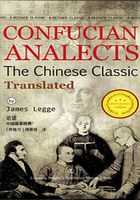
CHAPTER 6
The Master said, "My doctrines make no way. I will get upon a raft, and float about on the sea. He that will accompany me will be Yew, I dare to say." Tsze-loo hearing this was
4. OF YEN YUNG. READINESS WITH THE TONGUE NO PART OF VIRTUE. 1.冉雍, styled仲弓, has his tablet the second, on the east of Conf. own tablet, among 'the wise ones'. His father was a worthless character (see VI.4), but himself was the opposite. 佞means 'ability', generally, then 'ability of speech', often, though not here, with the bad sense of artfulness and flattery. 2. Conf. would not grant that Yung was仁, but his not being 佞 was in his favour rather than otherwise. 口给(read keĕ. See Dict.), 'smartnesses of speech'. 焉 is here 'why', rather than 'how'. The first 焉用仁 is a gen. statement, not having, like the sec., special reference to Yen Yung. In the 注疏, 不知其仁焉用佞, is read as one sentence;—'I do not know how the virtuous should also use readiness of speech'. This is not so good as the received interpretation.
5. TSEIH-TEAOU K'AE'S OPINION OF THE QUALIFICATIONS NECESSARY TO THAKING OFFICE. Tseih-teaou, now 6th, on the east, in the out. hall, was styled 子若. His name originally was 启, changed into 开, on the accession of the Emperor 孝景, A.D.155, whose name was also 启. The diff. in the ch. is with 斯—what does it refer to? and with 信—what is its force? In the ch. about the disciples in the 家语, it is said that K'ae was reading in the Shoo-king, when Conf. spoke to him about taking office, and he pointed to the book, or some particular passage in it, saying, 'I am not yet able to rest in the assurance of (信=真知确见) this.' It may have been so. Obs. the force of the 之;—'There is as yet my want of faith of this.'
6. CONFUCIUS PROPOSING TO WITHDRAW FROM THE WORLD;—A LESSON TO TSZE-LOO. Tsze-loo supposed his master really meant to leave the world, and the idea of floating along the coasts, pleased his ardent temper, while he was delighted with the compliment paid to himself. But Conf. only expressed in this way his regret at the backwardness of men to receive his doctrines. 无所取材 is diff. of interpretation. Choo He takes 材 as being for 裁, 'to cut out clothes', 'to estimate, discriminate', and hence the mean. in the transl. An old comm., 郑立, keeping the mean. of 材, explains—无所取于桴材,= 'my meaning is not to be found in the raft.' Another old writer makes 材=哉, and putting a stop at 勇 expl. —'Yew is fond of daring; He cannot go beyond himself to find my meaning.' 与, here= 'I dare to say.'

glad, upon which the Master said, "Yew is fonder of daring than I am. He does not exercise his judgment upon matters."